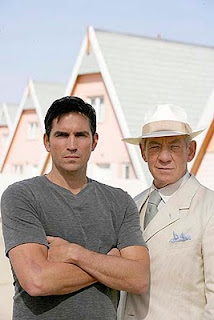 If cinema, at its core, is a visual art form, then Nicolas Roeg’s debut feature Walkabout is surely one of the greatest examples of filmmaking. The screenplay, written by Edward Bond, was allegedly only 14 pages long, and yet the movie has a 100-minute running time. It isn’t hard to believe that tidbit once you see the movie, as the dialogue is sparse, and yet it has the power to hold the viewer in its grip as effortlessly as something written by David Mamet. The characterizations, of which there are really only three, are as rich as the breathtaking scenery, which, when it comes down to it, is probably the real star of Walkabout.
If cinema, at its core, is a visual art form, then Nicolas Roeg’s debut feature Walkabout is surely one of the greatest examples of filmmaking. The screenplay, written by Edward Bond, was allegedly only 14 pages long, and yet the movie has a 100-minute running time. It isn’t hard to believe that tidbit once you see the movie, as the dialogue is sparse, and yet it has the power to hold the viewer in its grip as effortlessly as something written by David Mamet. The characterizations, of which there are really only three, are as rich as the breathtaking scenery, which, when it comes down to it, is probably the real star of Walkabout.The story begins with a father taking his teenage daughter (Jenny Agutter) and much younger son (Luc Roeg) into the Australian outback for a picnic. But something is wrong with the man, and while the girl sets up the lunch, the man pulls out a gun and starts firing at his children. They take cover behind some rocks, and soon enough the father just loses it altogether, douses the car in gasoline, sets it on fire and then takes his own life. It’s a horrific sequence, made vaguely palatable by today’s standards, only because we hear stories like this all too often on the news. Or perhaps that simply makes it more relevant. The girl does a good job of convincing the boy that they must go on ahead without their father, and that “he’ll meet them later,” as the boy doesn’t really understand what happened. And so the girl and the boy (we never do learn their names) are stuck in the middle of nowhere, with no idea how to get home or how to survive.
Read the rest of this Blu-ray review by clicking here and visiting Bullz-Eye.



















